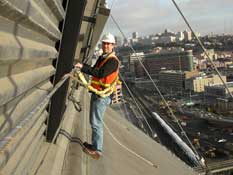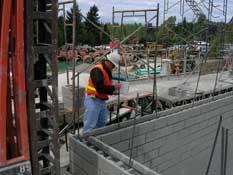|
|||||
Become a ›› Introduction -------------------------------- Inspection Courses Reinforced Concrete: Structural Ultrasonic Technician Magnetic Particle Testing Level II Special Inspector Certification Renewal Lateral Framing Special Inspection Proprietary Anchors Inspection WAQTC |
License types, descriptions and prerequisites |
||||
ACI Field Technician: This certification serves as a prerequisite for several WABO licenses. It is earned by successfully passing a nationalized multiple choice exam with a score of 70% or greater overall, and a minimum of 60% correct on each of seven sections. The exam is accompanied by a practical exam where the applicant will complete the following field tests as prescribed by the American Society for Testing & Materials (ASTM): · C 1064 - Temperature of Freshly Mixed Portland-Cement Concrete
There is a single nighttime class offering review of ASTM requirements of each test, and while this class should not be used for primary instruction, it does offer numerous insights and valuable information in passing the written portion of the exam. There are no interview requirements for the ACI Field Technician certification, and if both the written and practical portions are passed, one can expect to receive a certification card within approximately 6 weeks of the test date. Concrete Placement and Batch Plant Inspection: This WABO license allows the inspector to independently monitor placement of concrete in non-complicated members (excludes elevated and post-tensioned concrete slabs, and high strength walls and columns), as well as batch-plant inspection of high strength concrete, which requires monitoring and inspection of procedures at the concrete supplier’s plant. This license requires successful completion of a six-week course sponsored by the Northwest Council of Engineering Laboratories, two supervised batch plant inspections and 80 hours of documented field experience. Placement inspectors must hold a current ACI Field Testing Technician certification. This course is generally offered three to four times per year. Proprietary Anchor Inspection: Inspectors holding a proprietary anchor license will be qualified to inspect installation of a wide variety of anchor bolts, drilled-in-concrete-anchors, and installation of bolts, threaded rod and reinforcing steel using adhesive products. This license requires approximately 8 hours of classroom instruction, additional instruction in plan reading and successful passage of an exam. Proprietary Anchor certification is currently under development and will become a requirement by 2007. Reinforced Concrete: As described above, Reinforced Concrete Special Inspection is a WABO license that corresponds to a licensing requirement governed by the International Code Council. Reinforced concrete inspectors are able to autonomously inspect reinforcing steel and concrete placement for all concrete members except those using prestressed (commonly referred to as post-tensioned) or shotcrete placement techniques. Examples of reinforced concrete include footings, slabs on grade, cast in place or precast wall panels and columns. Reinforced Concrete certification requires a current ACI Field Technician certification, passage of the ICC Reinforced Concrete Special Inspection Exam; an interview with a WABO designated official and at least 1,000 hours or 1 year of field experience. The Northwest Council of Engineering Labs offers a class designed to assist inspectors in passing this exam. Prestressed / Post-Tensioned Concrete: Prestressed concrete is reinforced concrete that contains cable tendons designed to introduce pre-loading forces that create tension on the concrete. This tension allows the concrete to better carry a load. Prestressed concrete is often seen in construction of parking garages, as well as certain office and multi-family residential applications. Most PT certified inspectors have a high degree of field experience due to the complicated nature of the work. PT inspectors are called upon to inspect the reinforcing steel and prestressing tendons prior to placement of concrete, monitor and measure the elongation of those tendons under hydraulic pressure, and then to supervise the cutting of tendon tails so the exposed holes can be patched. To earn a prestressed concrete license, one must hold a current ACI Field Technician Level I certification, a reinforced concrete license, passage of an ICC exam and interview by a WABO designated official. Shotcrete: While in most areas of the United States, shotcrete falls under the purview of ordinary reinforced concrete, inspection of this type of concrete requires a separate license. Shotcrete is a pressurized application of concrete, most often used for shoring of excavated areas, casting of walls without forms, and even swimming pools. There are two types of shotcrete application both utilize a special concrete pump and air compressor which forces concrete out under pressure from a hose line. The dry method pumps dry ingredients through the hose line and water is mixed at the nozzle, while the wet method uses ready-mixed concrete with only air and concrete mixed at the nozzle. Shotcrete certification is earned by attending 6 hours of classroom instruction (typically during two night time sections), attendance of a preconstruction test panel shotcrete application, preconstruction meeting, passing an exam administered by WABO, and an interview with a WABO designated official. Structural Masonry: Masonry inspectors are responsible for verification of correct construction procedures in assembling walls, adding of reinforcement and placement of Structural Steel / High Strength Bolting: ICC has recently separated Structural Steel Special Inspection certifications into two separate licenses. The first relates to high strength bolting. Bolting inspectors verify correct installation of high strength bolts on structural steel erection projects, as well as certain applications within other types of structures. These inspections may be completed visually, or may require use of special tools such as a torque wrench or a Skidmore-Wilhelm Bolt Tension Calibrator. NWCEL classes are in development to assist applicants in passing the ICC exam. An interview with a WABO designated official will follow passage of the exam in securing this license. Structural Steel / Welding: The other component to Structural Steel Special Inspection is welding. Inspection of welds involves visual or non-destructive testing to verify integrity of the welds. While some welds can be inspected after they are complete, simply by careful visual examination, complex, larger sized or welds in vital areas of structures may require the inspector to continuously observe the process. These inspections may occur on the jobsite or in a fabrication shop. Non-destructive testing involves use of penetrating dye or magnetic particles, as well as ultrasound or x-rays to look for faults in the weld. Welding inspections are necessary on virtually every type of structure, even wood framed mix-use type buildings that often use a small amount of structural steel to provide extra strength in critical areas of the building. To earn a Structural Steel Welding license, one must pass the ICC Welding exam or earn the Certified Welding Inspector license through the American Welding Society. An interview with a WABO designated official will follow. Additionally, there are separate certification requirements for various types of non-destructive testing: magnetic particle, dye penetrant, ultrasonic testing, x-ray, and etcetera. Spray Applied Fire Resistive Materials: An accompanying component of structural steel type structures is spray applied fire resistive materials. Fireproofing is often seen as a fluffy covering to structural steel columns, beams and joists. Inspection of this material includes verification of proper application techniques, measurement of depth of coverage in relation to project specifications, and preparation of samples for laboratory analysis. This license is earned by successfully passing the ICC certification exam and interview with a WABO designated official. Lateral Framing: This is a relatively new license for WABO, and like shotcrete, does not have an ICC-sanctioned exam. Lateral Framing has recently replaced the Lateral Wood Certification, and not only included inspection of shearwalls constructed of softwoods, but also cold-form steel structures. Inspectors conducting lateral framing inspection are expected to verify correct installation of anchor bolts and hold-downs, correct wall and diaphragm nailing or screw patterns, stitch welding of metal studs, diaphragm clips and much more. This license is earned by passing an exam and accompanying interview administered by WABO. Nuclear Densometer: Earning this certification requires successful completion of an 8-hour radiation safety course and on-the-job training as determined by the individual testing laboratory. Densometer operators are responsible for determining in-place density of soils, aggregate and asphalt, more commonly referred to as compaction testing. These inspections rely on strong coordination with laboratory personnel because in order to determine the percentage of compaction, numbers determined on site must be compared to the soil-moisture relationship curve provided by a proctor test prepared in the lab. Soils inspectors may be called upon to remain on a project full time to witness fill operations or asphalt paving, or may be required on a more periodic basis and service multiple projects in a single day. Renewals: Seminar courses are required for inspectors to renew their certifications; WABO licenses are renewed each year, and every third year ICC licenses expire. Inspectors must accumulate 2.5 Continuing Education Units to renew ICC licenses; these units are earned by attending courses for additional licenses or renewal seminars. |
|||||








 There are generally four to five ACI Certification events held each year in the Seattle Area. An entry-level inspector will generally train with an experienced and licensed inspector for a requisite period of time until an opportunity to take this exam comes up.
There are generally four to five ACI Certification events held each year in the Seattle Area. An entry-level inspector will generally train with an experienced and licensed inspector for a requisite period of time until an opportunity to take this exam comes up.  masonry grout. Some projects, particularly schools and hospitals require full time inspection of structural masonry. This means that if the construction crew erecting masonry walls are working, there must be a special inspector on site to witness their work as well as to prepare field tests. More often, masonry inspection is periodic, meaning the inspector need only be present to verify installation of reinforcement and inspect general craftsmanship when grout is to be placed. Masonry inspectors earn their license by successfully passing the structural masonry exam offered by ICC and interview with a WABO designated official. The Northwest Council of Engineering Laboratories offers a class designed to assist inspectors in passing the exam.
masonry grout. Some projects, particularly schools and hospitals require full time inspection of structural masonry. This means that if the construction crew erecting masonry walls are working, there must be a special inspector on site to witness their work as well as to prepare field tests. More often, masonry inspection is periodic, meaning the inspector need only be present to verify installation of reinforcement and inspect general craftsmanship when grout is to be placed. Masonry inspectors earn their license by successfully passing the structural masonry exam offered by ICC and interview with a WABO designated official. The Northwest Council of Engineering Laboratories offers a class designed to assist inspectors in passing the exam.